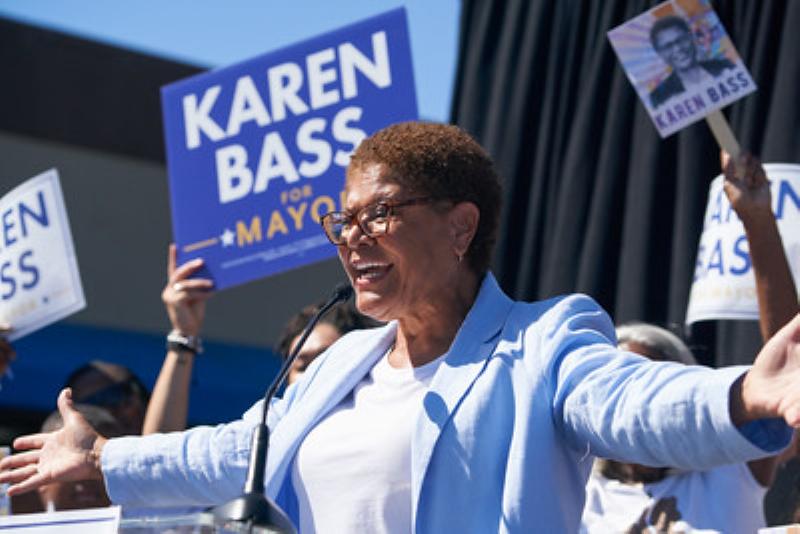


In the latest pushback by California officials against federal immigration enforcement, Los Angeles mayor Karen Bass announced a card program to provide “a couple hundred dollars” to persons affected by Immigration and Customs Enforcement (ICE) raids. The handout program was part of a broader executive order reinforcing local law enforcement non-cooperation with ICE.
The cards will be available to legal and illegal aliens, the regulations to be forthcoming. (Ever notice Democrats first announce handouts, then maybe think about qualifications?)
Bass was quick to point out that the cards are not being funded by deficit-ridden Los Angeles. The money, she says, will come from private donors and philanthropies.
The mayor and her political establishment justify the handouts on the grounds that they really benefit local community stability because, if an alien does not go to work out of fear of being detained, he lacks income to pay rent. Preventing evictions is one argument being advanced for the handout program.
A few observations:
First, if the program is truly a private initiative, why was the mayor announcing it? I can understand what’s in it for the mayor: Handouts associated with the party in power always have appeal. Some New Jersey taxpayers, paying among the highest property taxes in the country, always get a “property tax rebate check” with the incumbent governor’s signature emblazoned on it on or about October 1, a few weeks before elections.
Is California civil society so intimidated about acting on its own that its initiatives must come from government? Or, in fact, is this a mix of public-and-private action? If so, may one ask whether the mayor has undertaken any similar partnership to address, say, ongoing issues for Los Angeles wildfire victims? Or Angeleno taxpayers, whose city is facing a deficit some estimate up to $1 billion?
Second, notice how this program blurs not just lines between illegal and legal aliens, but between aliens and citizens? While the eligibility regs remain to be published, the advance publicity is that immigration status will not be a factor.
Well, even (legal) immigrants have no right to public money.
When a person receives an immigrant visa and legally enters the United States, the person sponsoring him must sign an affidavit of support indicating that they will financially back that immigrant until he (a) becomes a citizen or (b) has worked ten years and, therefore, is fully vested into Social Security through 40 quarters of earnings. The affidavit of support is supposed to be a legally binding agreement — i.e., in theory, U.S. attorneys can force sponsors to support the immigrants for whom they sought visas. In practice, that rarely happens.
The affidavit of support is required for immigrant visas. But every visa applicant — non-immigrant and immigrant — has to overcome the ineligibility of “public charge.” Under U.S. law, any foreigner legally entering the United States has to demonstrate that he has the means to support himself while he’s here. In the case of an immigrant, it means either an employer’s job offer or the commitment of the immigrant’s sponsor. In the case of non-immigrants, it means being able to show that one can be in the United States for one’s stated purpose of travel without needing to work. If you’re coming for a two-week vacation in New York, for example, do you have the funds? A place to stay? The return ticket?
Behind the public charge ineligibility is the expectation in American law that a foreigner cannot have recourse to public assistance. Put bluntly, no American should have to pay for a foreigner to be here legally, temporarily or permanently.
If American laws expect legal foreigners to be able to pay their own way, it clearly deems illegals ineligible to have recourse to public money.
Sanctuary states, of course, maintain they can do what they want with their own state funds. Even if that is technically true, it runs against the longstanding federal conviction that only American citizens have claims and dibs on public funds in America. A society has responsibility to care for its own people within a system of rule of law. In a world where material resources are limited — money diminishes as it’s divided among more people — priority belongs to those with a right to be here (citizens). Those who do not inherently have a right to be here but have been allowed in — immigrants — may rightly be regulated in how much, if at all, they may benefit from public funds. Those who have neither the right to be here nor been allowed in legally clearly have no right to benefit from public money or programs paid for by it.
In the end, the real issue isn’t just cash cards — it is sovereignty, citizenship, and the rule of law. When cities like Los Angeles, cloaked in the language of “dignity,” bypass federal immigration policy and offer material incentives to those with no legal right to be here, they are not just undermining enforcement; they are erasing the line between citizen and non-citizen.
If immigration law means anything, it must mean that citizenship confers obligations and entitlements. When politicians unilaterally decide otherwise — funded by “philanthropies” whose interests may not align with the American people — they’re not practicing charity. They’re practicing nullification. And that puts both federalism and the constitutional order itself on notice.
<img alt="
Image: Karen Bass. <a 52383410418="" href=" https:=" n03="" photos="" www.flickr.com=" ">Flickr, public domain.
<a 52383410418="" href=" https:=" n03="" photos="" www.flickr.com=" "><a 52383410418="" href=" https:=" n03="" photos="" www.flickr.com="">" captext="
